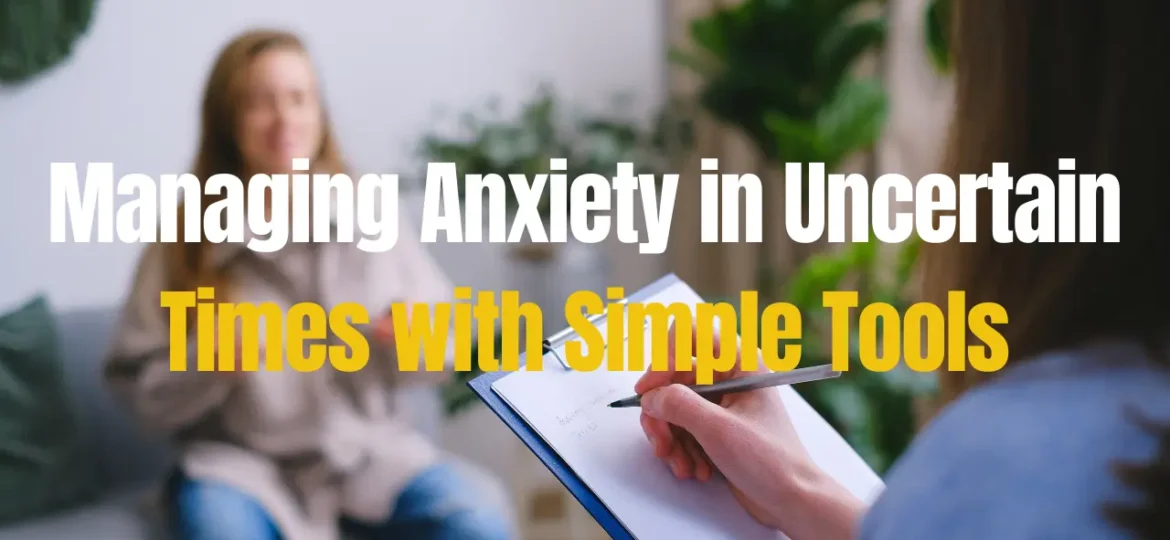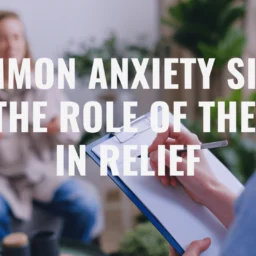
It’s no secret that the past few years have tested our emotional resilience. With a global pandemic, economic instability, climate anxieties, and shifting social landscapes, many of us have been left wondering what tomorrow will bring. This uncertainty can easily trigger stress and anxiety, sometimes to the point where it becomes hard to function.
For many in Massachusetts—and particularly in places like Dartmouth—seeking professional help from an anxiety therapist has become a meaningful way to regain a sense of control and peace. But therapy is just one piece of the puzzle. There are also a wide variety of simple, powerful tools that can be used daily to calm the mind and regain stability.
In this article, we’ll explore how to manage anxiety with both professional support and simple tools you can use at home. Whether you’re someone who has lived with anxiety for years, or you’re newly navigating the stresses of an unpredictable world, this guide offers hope, clarity, and practical strategies that work.
Finding the Right Anxiety Therapist in Dartmouth
Mental health challenges, especially anxiety, often worsen when ignored. While some people try to “push through” the discomfort, the most effective strategy is learning to cope and manage anxiety in healthy ways. This is where professional help comes in.
In Massachusetts, the demand for qualified mental health practitioners is growing, especially for specialists in anxiety management. Dartmouth residents now have access to therapists who offer individualized support based on science-backed methods like:
- Cognitive Behavioral Therapy (CBT): Restructures anxious thought patterns.
- Mindfulness-Based Cognitive Therapy (MBCT): Combines mindfulness and CBT.
- Exposure Therapy: Helps individuals gradually face fears in a safe setting.
- Acceptance and Commitment Therapy (ACT): Encourages acceptance of anxious thoughts rather than resistance.
Working with an anxiety therapist in Dartmouth offers not only personalized strategies but also a compassionate partnership in your journey toward calmness and mental clarity.
What to Expect from Your First Session
Your first therapy session might feel nerve-racking, especially if you’re new to the process. A good stress therapist in Dartmouth will take time to build trust, answer your questions, and learn about your experiences with anxiety.
Here’s what might happen:
- You’ll be asked about your personal history and current stressors.
- You’ll identify what anxiety looks like for you—physical symptoms, thought patterns, behaviors.
- You’ll co-create a treatment plan with manageable goals.
- You might learn a few calming techniques right away to begin using between sessions.
Therapists work with you, not at you. They aim to empower you to take control of your anxiety, rather than be ruled by it. Over time, you’ll not only understand your anxiety better but also develop the confidence and tools to manage it.
Simple Tools for Anxiety Management in MA
Even without formal therapy, you can begin managing anxiety on your own using techniques that bring your nervous system back into balance. These tools are especially helpful for those who may be on a waiting list or looking for anxiety management in MA without immediate clinical access.
Here are several methods that have helped thousands of people:
- Box Breathing (4-4-4-4)
- Breathe in for 4 seconds, hold for 4, exhale for 4, hold again for 4. Repeat. This technique is used by athletes, soldiers, and therapists to bring rapid calm to the body.
- Mindfulness Meditation
- Focusing on your breath or bodily sensations can stop anxiety from spiraling. Apps like Insight Timer and Headspace offer guided meditations that take just 5–10 minutes.
- Grounding Techniques
- Use your senses to bring yourself back to the present:
- 5 things you can see
- 4 you can touch
- 3 you can hear
- 2 you can smell
- 1 you can taste
This is especially helpful when anxiety feels overwhelming and disorienting.
- Gentle Movement
- Walking, yoga, and light stretching help release cortisol and bring endorphins into the body. Even a short 15-minute walk can significantly reduce stress.
- Digital Detox
- Limiting news consumption and social media use is critical. Constant information inflow can keep the brain in a hyper-alert state. Schedule tech-free times, especially before bed.
- Sleep Hygiene
- Poor sleep worsens anxiety. Create a bedtime routine that includes calming activities like reading, herbal tea, or listening to soft music. Avoid screens for at least 30 minutes before sleeping.
By incorporating these tools into your routine, you can begin to build a strong foundation for emotional resilience, even if the world around you feel unstable.
Journaling and Emotional Expression
Writing is an often-underestimated therapeutic tool. When your thoughts are racing or you feel overwhelmed, journaling helps organize your mind and make sense of what’s happening inside.
Some helpful journaling prompts include:
- “What am I anxious about today?”
- “What is within my control right now?”
- “What do I need to hear to feel safe?”
- “What patterns am I noticing in my thoughts or feelings?”
For many, this simple practice opens up insight and clarity that helps lessen emotional load. Many anxiety therapists in Dartmouth even encourage their clients to journal between sessions.
Coping with Anxiety in Real Time
No two people experience anxiety the same way. That’s why creating a personalized coping strategy is more effective than relying on generalized advice.
Here’s how to start building yours:
- Identify Triggers: What situations, people, or environments make you anxious?
- Recognize Symptoms Early: Can you spot when your body or thoughts begin shifting?
- Have Go-To Tools: Breathing, grounding, or calling a supportive friend.
- Build a Safe Space: Create a mental or physical space where you feel calm and secure—this could be a cozy room, a walk in nature, or listening to music.
If you’re working with a therapist, they’ll help tailor this plan to your specific needs. But even on your own, writing out a plan can make you feel prepared and capable.
Using Support Systems and Community Resources
Healing doesn’t happen in isolation. In Massachusetts, many community centers, religious institutions, and schools offer support groups, workshops, and counseling services focused on anxiety and emotional wellness.
Some resources include:
- Local NAMI (National Alliance on Mental Illness) chapters
- University-based mental health clinics
- Online therapy platforms with providers licensed in MA
- Community yoga and wellness classes
- Faith-based support groups
In Dartmouth specifically, more people are now seeking stress therapy and holistic wellness, opening the door for broader acceptance and access.
The Long-Term Impact of Chronic Anxiety
Unchecked anxiety can lead to serious health consequences: high blood pressure, compromised immunity, gastrointestinal issues, chronic fatigue, and even substance use. Beyond the physical, it can interfere with personal growth, connection, and life satisfaction.
In our fast-paced, high-pressure world, stress therapy in Dartmouth and surrounding areas is not a luxury—it’s a necessity. Whether you’re a student, parent, teacher, caregiver, or business owner, you need tools to handle stress effectively.
The Role of Local Therapists and Mental Health Professionals
Therapists in Dartmouth play a crucial role in this cultural shift. Many offer:
- Sliding-scale fees
- Virtual therapy sessions
- Family therapy for collective healing
- Trauma-informed approaches
- Culturally competent care for diverse backgrounds
The ability to access personalized anxiety management in MA means that you’re no longer expected to tough it out alone. Help is available, and therapists are trained to help you navigate both the inner and outer chaos with grace and strength.
Lifestyle Shifts That Reduce Anxiety Over Time
While quick tools like breathing exercises are effective in the moment, sustainable anxiety management often involves broader lifestyle adjustments. Think of these as your emotional immune system—the stronger your day-to-day habits, the more resilient you’ll be during times of heightened stress.
Here are a few long-term changes that support anxiety reduction:
- Nutrition for the Nervous System: Foods rich in magnesium (like spinach and dark chocolate), omega-3s (like salmon and walnuts), and B vitamins (like eggs and legumes) support brain health. Avoiding caffeine, sugar, and alcohol during high-stress periods can also make a noticeable difference in mood and focus.
- Consistent Exercise: Regular movement doesn’t have to be intense. Even low-impact activities like walking, swimming, or dancing release endorphins and reduce cortisol. Aim for 30 minutes a day, five days a week.
- Structured Routines: Chaos breeds anxiety. Creating structure in your day—even something as simple as a morning routine—can help anchor your mind and reduce decision fatigue.
- Digital Boundaries: Instead of reacting to every ping or headline, choose intentional times to engage with media. This gives your brain room to rest and reset.
By working with a stress therapist in Dartmouth, you can identify which of these lifestyle changes would make the most immediate impact in your life and build them into a personalized, sustainable plan.
Managing Anxiety in Academic and Work Environments
Anxiety often flares in academic and professional spaces, where performance, deadlines, and competition add layers of pressure. If you’re a student, teacher, or employee in Massachusetts, you’re not alone in facing these challenges.
Students in particular are turning to anxiety therapists in Dartmouth to help with academic overwhelm, test anxiety, and fear of failure. Similarly, working professionals are seeking guidance for public speaking fears, job insecurity, and burnout.
Employers and schools in MA are becoming more proactive by offering:
- Employee Assistance Programs (EAPs)
- On-site wellness counselors
- Mindfulness breaks and wellness days
- Flexible scheduling for mental health appointments
If you find yourself struggling to stay focused, motivated, or emotionally stable at work or school, don’t wait until things unravel. Early support leads to stronger, more lasting recovery—and it’s always okay to ask for help.
Building Emotional Resilience for the Long Haul
Ultimately, coping with anxiety in MA is about more than just “fixing” symptoms—it’s about building a lifestyle of emotional strength. Resilience doesn’t mean you never feel stress or fear. It means you can face those feelings with skills, self-compassion, and clarity.
Here are a few ways to build emotional resilience:
- Self-awareness: Understand your patterns, reactions, and triggers.
- Support systems: Maintain healthy relationships that allow vulnerability.
- Growth mindset: View setbacks as part of the learning curve.
- Rest and restoration: Regularly schedule downtime—not just when you burn out.
With the support of a licensed anxiety therapist in Dartmouth and your own commitment to self-care, you can transform anxiety into a force for personal growth.
Conclusion
Living with anxiety during uncertain times is not a personal failure. It’s a human response to a complex world. But there are paths forward—tools that work, professionals who care, and small choices that lead to big change.
Whether you start by scheduling your first session with an anxiety therapist in Dartmouth, trying a breathing exercise before bed, or journaling your anxious thoughts, you’re already moving toward healing.
There is no one solution—but there are many ways to feel better. With time, support, and practice, you’ll discover that anxiety doesn’t have to rule your life. You have more power than you realize.
And if you’re searching for a deeper understanding of your emotions or want to connect with others who’ve walked the same road, consider listening to our podcast episodes featuring mental health experts and real stories of transformation. Sometimes, hearing someone else’s journey reminds you that you’re never in this alone.



